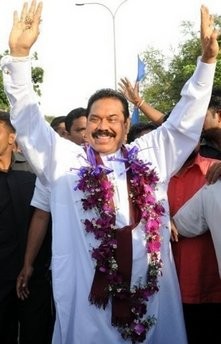Sri Lanka's defeated presidential candidate who failed in a bid to unseat incumbent Mahinda Rajapakse was in hiding Thursday in Colombo after warning of possible attempts on his life.
Former four-star general Sarath Fonseka was resoundingly defeated in the country's first post-war election and was then stripped of his 80-strong state security team which he said he needed to keep him safe.
"We have moved to a house in Colombo, but I can't tell you the location for obvious reasons," one of Fonseka's bodyguards told AFP late Wednesday.
In a day of high drama Wednesday that followed a bitter and vitriolic contest between the former allies, Fonseka rejected Rajapakse's victory and said he would mount a legal challenge.
Throughout the day, he was surrounded by heavily armed soldiers in a luxury hotel in central Colombo and he claimed he was unable to leave because he would be arrested or assassinated.
He eventually slipped out unimpeded after dark.
Rajapakse rode a wave of support among the majority Sinhalese population in the south to win the election, but he lost out to Fonseka in the Tamil areas in the north.
The 64-year-old president, who has close family members in key government positions, is a Sinhalese nationalist who ordered an offensive after taking office in 2005 to crush Tamil rebels and their 37-year separatist struggle.
The battle against the Tamil Tigers, who took up arms in 1972, has since been mired in war crimes allegations. Fonseka was the army chief credited with the military victory.
Analysts say Sri Lanka faces an enormous task in rebuilding its economy and is under stiff international pressure to secure a lasting political solution that addresses the grievances of its large Tamil minority.
Rajapakse and Fonseka, who belong to the Sinhalese majority, had both courted Tamil voters during the campaign with pledges of greater political inclusion and investment in the devastated northeast.
"I want to reach out to the Tamil people even though they did not vote for me this time," Rajapakse told reporters.
"What is important is to get them involved in a truly democratic election process," he added.
"We can sit and talk with them. See what their problems are. We can work together."
Rajapakse also said Wednesday that he was keen to repair relations with Western nations that were strained during the conflict due to criticism of Colombo's human rights record from the US, Britain and the European Union.
"Most of our misunderstandings were due to the fighting. It is over now. I am on my second (and final) term and we can work together to address any outstanding issues," he said from his residence.
Sri Lanka increasingly distanced itself from the West as it came under fire for its human rights record. It has built ties with China and Iran and last year hosted Myanmar's reclusive military leader Than Shwe.
Fonseka said Wednesday that he and the assorted coalition of opposition parties that backed him would challenge the election verdict, making their next step the filing of a petition at the Supreme Court.

But he also suggested he might have to flee abroad because the government had stripped him of his security, which he said was a deliberate ploy to leave him vulnerable to assassination by militants or government loyalists.
"They will try to assassinate me and then blame it on someone else," he told reporters.
Leaving the country in the short-term might be the best option, said the father-of-two who holds a US Green Card that gives him residency rights in the country.
Independent election monitors criticised the abuse of state resources by the government for campaigning ahead of the election, as well as violence on election day particularly in the north.
They stopped short of repudiating the vote, however.
























